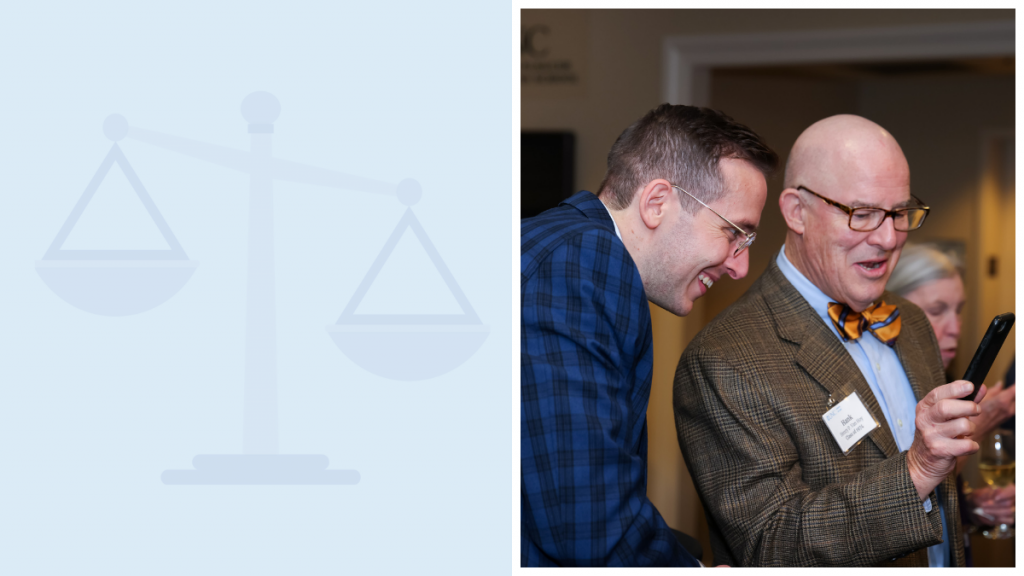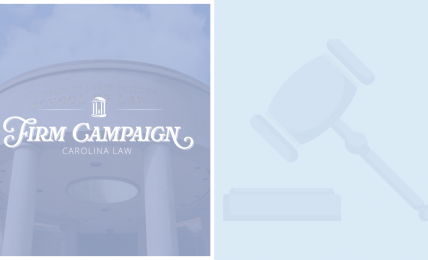
Troy Homesley ’17 has always believed that philanthropy and charitable giving are important if a person has the means. But he describes his giving for the first few years after graduating from UNC School of Law as “random and unplanned.” and felt unsure about what impact he was having.
Homesley learned about the School’s Cornerstone Club from a partner at Troutman Pepper Locke, the firm where he works as an associate specializing in civil and regulatory litigation. He was attracted by the opportunity to give back to the School in a planned, strategic manner.
“I’m thrilled to invest in Carolina Law. I believe alumni play an important role in keeping the School accessible to all who earn admission,” said Homesley, who joined the Cornerstone Club in 2024 with his wife, Sonya, who is also a Carolina (undergraduate) alumna. “Carolina is an institution of and for the people, and I think that living up to that promise is even more important in the context of the School of Law. Many graduates of Carolina Law go on to become public servants, and it is fundamental that our state’s lawyers should be representative of the state’s populace. Keeping Carolina accessible is essential to making that a reality.”
Cornerstone Club members commit to support Carolina Law with an annual gift of $10,000. The club plays a vital role in preserving the School’s ability to offer a superb legal education at a far lower cost than other prominent national law schools. Members enjoy networking and engagement opportunities, such as a twice-yearly summit to celebrate Carolina Law and generate ideas to uplift the School.
Philanthropy may feel out of reach for alumni in the first years after graduation, but the Step Into Cornerstone program makes it easier for young alumni to . The program invites alumni who have graduated within the past 15 years to join at a lower initial giving level and work up to the full annual giving amount over four years, all while enjoying full membership in the Cornerstone Club.
Maddy Hunter Thompson ’18 and her wife, Meredith, who is also a Carolina (undergraduate) alumna, were part of a group of young Carolina Law alumni and significant others who proposed making membership in the Cornerstone Club more accessible to recent graduates. Hunter Thompson also works in the Charlotte office of Troutman Pepper Locke as a commercial real estate associate. While studying at Carolina Law, Hunter Thompson worked in the School’s Office of Advancement, where she saw firsthand the impact of reduced state funding and the increasing importance of private giving and alumni engagement.
“Engaging more young alumni in the Cornerstone Club is a win-win for the School and the young alumni,” said Hunter Thompson. “Carolina Law can only benefit by increasing its donor base, having a greater number of alumni highly engaged with the School, and energizing the Cornerstone Club. This opportunity also helps young alumni who might have wanted to get engaged with the School but continued to put it off until later, because they felt like meaningful engagement opportunities are more readily available to those who are more established in their careers. However, things that get put off until later often do not happen.”
Members of the Cornerstone Club provide critical funding to address Carolina Law’s most immediate needs and highest funding priorities. Their support is crucial to cement a consistent ranking in the nation’s top 20 law schools and maintain high standards of accessibility and excellence. Cornerstone Club members share the dean’s vision for the School and their giving supports his strategic focus on scholarships, faculty excellence, curriculum expansion and the creation of a competitive facility.
“Supporting Carolina Law is important because the School is not just training more big law firm attorneys. So many Carolina Law alumni go on to work in government or in small firms. Some alumni may be one of only a few lawyers in a small town,” said Hunter Thompson. “Without these types of students having access to study at Carolina Law, so many North Carolinians wouldn’t have access to legal services or justice.”



